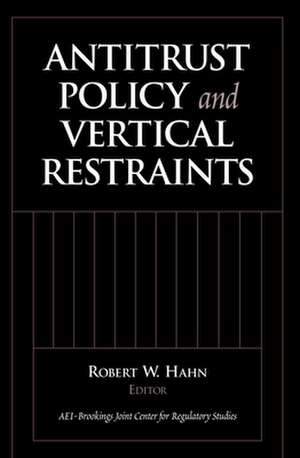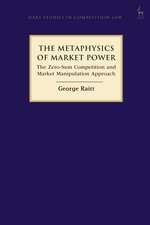Antitrust Policy and Vertical Restraints: AEI-Brookings Joint Center for Regulatory Studies S.
Editat de Robert W. Hahnen Limba Engleză Paperback – 12 iul 2006
Antitrust law is intended to protect consumer welfare and foster competition. At first glance, however, it is often unclear whether certain business practices have positive or detrimental effects. Businesses frequently engage in activities that may appear anticompetitive on the surface, but are actually beneficial to consumers. Business tying practices, for example, make the sale of one product conditional upon the sale of another product. This practice can either deprive consumers of choice and drive up prices or lower costs and improve convenience. Therefore, it is critical that policymakers have a keen understanding of which vertical restraints—limitations imposed on businesses by firms located in the production chain—are likely to harm consumers more than they benefit competition. In order to formulate economically efficient policies, they must be able to identify and limit those practices that are likely to do more harm than good. In A ntitrust Policy and Vertical Restraints a group of leading scholars takes a hard look at how restraints limit the conditions under which firms may purchase, sell, or resell a good or service. The authors, representing both sides of the antitrust debate over tying practices, provide a uniquely broad perspective on this critical economic policy issue. Contributors include Dennis Carlton (University of Chicago), David Evans (University College London), Bruce Kobayashi (George Mason University), and Michael Waldman (Cornell University).
Preț: 162.25 lei
Nou
Puncte Express: 243
Preț estimativ în valută:
31.05€ • 32.41$ • 25.69£
31.05€ • 32.41$ • 25.69£
Carte tipărită la comandă
Livrare economică 05-19 aprilie
Preluare comenzi: 021 569.72.76
Specificații
ISBN-13: 9780815733911
ISBN-10: 0815733917
Pagini: 94
Dimensiuni: 152 x 229 x 8 mm
Greutate: 0.17 kg
Editura: Brookings Institution Press
Colecția Brookings Institution Press and AEI
Seria AEI-Brookings Joint Center for Regulatory Studies S.
ISBN-10: 0815733917
Pagini: 94
Dimensiuni: 152 x 229 x 8 mm
Greutate: 0.17 kg
Editura: Brookings Institution Press
Colecția Brookings Institution Press and AEI
Seria AEI-Brookings Joint Center for Regulatory Studies S.
Notă biografică
Robert W. Hahn is co-founder and executive director of the American Enterprise Institute Brookings Joint Center for Regulatory Studies and a resident scholar at AEI. He has served as a consultant to government and industry on a variety of issues involving regulation and antitrust.
Descriere
A Brookings Institution Press and American Enterprise Institute publication
Antitrust law is intended to protect consumer welfare and foster competition. At first glance, however, it is often unclear whether certain business practices have positive or detrimental effects. Businesses frequently engage in activities that may appear anticompetitive on the surface, but are actually beneficial to consumers. Business tying practices, for example, make the sale of one product conditional upon the sale of another product. This practice can either deprive consumers of choice and drive up prices or lower costs and improve convenience. Therefore, it is critical that policymakers have a keen understanding of which vertical restraints—limitations imposed on businesses by firms located in the production chain—are likely to harm consumers more than they benefit competition. In order to formulate economically efficient policies, they must be able to identify and limit those practices that are likely to do more harm than good.
In Antitrust Policy and Vertical Restraints a group of leading scholars takes a hard look at how restraints limit the conditions under which firms may purchase, sell, or resell a good or service. The authors, representing both sides of the antitrust debate over tying practices, provide a uniquely broad perspective on this critical economic policy issue.
Contributors include Dennis Carlton (University of Chicago), David Evans (University College London), Bruce Kobayashi (George Mason University), and Michael Waldman (Cornell University).
Antitrust law is intended to protect consumer welfare and foster competition. At first glance, however, it is often unclear whether certain business practices have positive or detrimental effects. Businesses frequently engage in activities that may appear anticompetitive on the surface, but are actually beneficial to consumers. Business tying practices, for example, make the sale of one product conditional upon the sale of another product. This practice can either deprive consumers of choice and drive up prices or lower costs and improve convenience. Therefore, it is critical that policymakers have a keen understanding of which vertical restraints—limitations imposed on businesses by firms located in the production chain—are likely to harm consumers more than they benefit competition. In order to formulate economically efficient policies, they must be able to identify and limit those practices that are likely to do more harm than good.
In Antitrust Policy and Vertical Restraints a group of leading scholars takes a hard look at how restraints limit the conditions under which firms may purchase, sell, or resell a good or service. The authors, representing both sides of the antitrust debate over tying practices, provide a uniquely broad perspective on this critical economic policy issue.
Contributors include Dennis Carlton (University of Chicago), David Evans (University College London), Bruce Kobayashi (George Mason University), and Michael Waldman (Cornell University).























